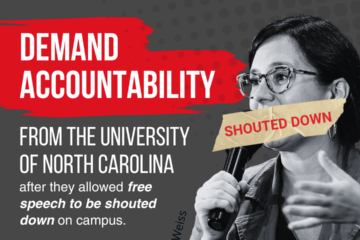About Us
Overview
“Congress shall make no law respecting an establishment of religion, or prohibiting the free exercise thereof; or abridging the freedom of speech, or of the press; or the right of the people peaceably to assemble, and to petition the Government for a redress of grievances.” -First Amendment to the United States Constitution
Students’ speech rights on campus are threatened on a regular basis. But the prospect of standing up to a school can be overwhelming – it can be expensive and time-consuming (not to mention awkward, since the student probably still wants a diploma at the end of the day). That’s why most students don’t take action. But what if students who wanted to stand up for free speech on campus were supported by like-minded students from all over the country? And what if those students were part of an organization that had the resources to fight back? Suddenly, it’s not so daunting after all.
That’s why Speech First exists. By coming together, we’ve created a nationwide community of free speech supporters to reassure students that they won’t fight these cases alone and that they’ll be supported every step of the way: on campus, in the media, and in court. We’re a membership association of students, parents, faculty, alumni, and concerned citizens who’ve had enough of the toxic censorship culture on college campuses, and who want to fight back.
We believe that free and open discourse is an essential component of a comprehensive education. We are committed to restoring the freedom of speech on college campuses because we believe that by exposing students to different and challenging ideas, they will emerge stronger, smarter, and more resilient.
Speech First will protect students’ free speech rights on campus. Through advocacy, litigation, and education, we will put colleges and universities on notice that shutting down unwanted speech will no longer be tolerated.
FAQs
A: Through both direct and indirect policies. Directly, there are speech codes, free speech zones, and restrictions on invited speakers that infringe the First Amendment freedoms that students should enjoy. Speech codes, which typically use civility requirements to create “safe spaces,” are a major tool that universities use to restrict speech. Free speech zones restrict the places on campus where students may speak freely. In addition, the way in which colleges regulate outside speakers can also be problematic, giving opponents of the speech a “heckler’s veto” and imposing burdensome security and financial requirements—especially when disproportionately imposed on outside speakers from one side of the ideological spectrum.
Indirectly, “bias reporting” protocols encourage students who overhear “offensive” or “biased” speech to report it anonymously to the university. University officials then may investigate the incident and meet with the student in question. These investigations by university officials create a “chilling effect” on students’ willingness to exercise their right to free speech.
A: All forms. We are committed to protecting the freedom of speech on campus in whatever form that may take.
A: Speech is “chilled” when individuals refrain from speaking because they fear they might violate a law or regulation. Chilling effects generally occur when a law is either too broad or too vague. For example, a college might have a student handbook that punishes speech that is “unwelcome,” “demeaning,” “discriminatory,” or creates an “intimidating,” “hostile,” or “offensive” environment. Because it is impossible to predict how people will feel, students refrain from speaking at all.
A: All speech. Left, right, popular, unpopular – it doesn’t matter. We want to defend the rights of speakers. And just as important, we want to defend the rights of listeners too.
A: By listening to our members and carefully monitoring schools. We will act to protect students from schools that try to stop them from expressing their views.
A: You can contact us through our website on the “Share Your Story” portal or reach out to our President directly. Your conversation will be kept confidential.
Contact Us
Email: info@speechfirst.org
Have any questions? Contact us to learn more!
